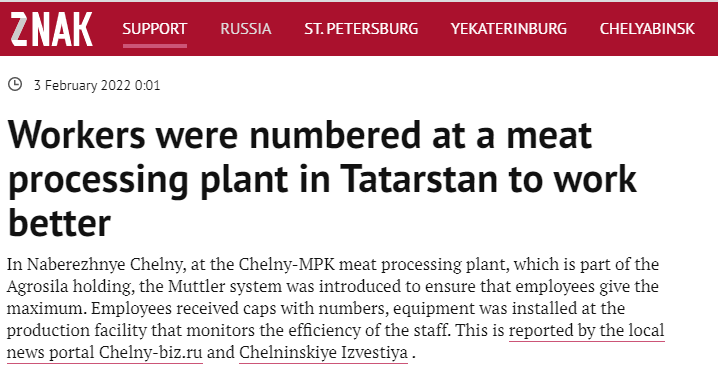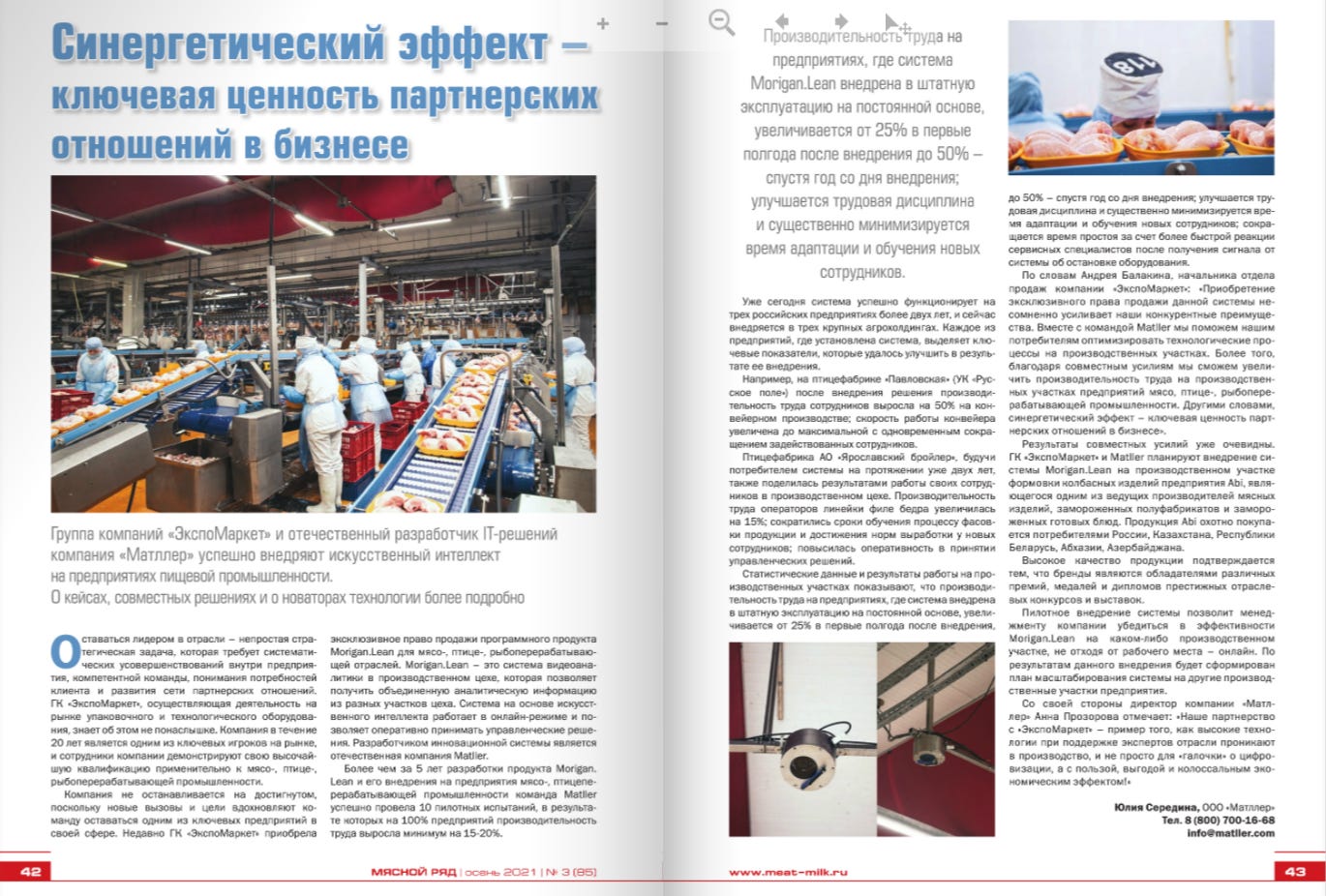Somewhere in Tatarstan, a muzzled woman is feverishly sorting a conveyor belt of raw meat; she has to be quick and precise—a camera is watching her, and this camera is hooked up to an algorithm, and this algorithm decides how many rubles she will receive.
Welcome to the Fourth Industrial Revolution?
The director of this Tatar meat-packing establishment is overjoyed by this new “efficiency-tracking” system, obviously:
“We have implemented the Matller system on the production lines, which gives an individual assessment of each employee. There are numbers on the hats of our employees. A camera is installed on the line, which calculates the labor costs of each employee and displays not the average output, but specific figures. In online mode, both the manager and the employee can find out the results,” said Svetlana Barsukova, General Director of Agrosila.
The employee’s monthly salary will depend on the results. The program automatically calculates daily output and salary.
“Accounting and labeling systems, big data analytics, robots, and much more… help businesses, working 24/7, to replace human labor,” Matller’s website notes. But for tasks that can’t be fully automated, there’s the Matller System:
It’s debatable whether this Tatarstan nightmare qualifies as uniquely soul-crushing; probably very similar systems are already in place all over the world. And maybe algorithm meat-sorting is preferable to peeing in a bottle during your 5-minute “wellness chamber” break at Amazon, or the Foxconn suicide nets.
But it was the numbered meat-sorter hats that caught our eye. These caps reminded us of a passage from H. G. Wells’ War and the Future (1917). In one chapter of his curious book, Wells tours a French munitions factory—staffed almost entirely by women:
There is a thick dust of sounds in the air, a rumble of shafting, sudden thuddings, clankings, and [the factory owner] M. Citroen has to raise his voice. He points out where he has made little changes in procedures, cut out some wasteful movement.... He has an idea and makes a note in the ever-ready notebook…
These women wear simple overalls and caps. In the cap is a rosette. Each shed has its own colour of rosette.
“There is much esprit de corps here,” says M. Citroen. “And also… we can see at once if a woman is not in her proper shed.”
A true visionary. Citroen even had an enterprising method of issuing salaries, a hundred years before the dawn of the “convenient” digital ruble:
What is interesting him just now, because it is the newest thing, is his method of paying his workers. He lifts a hand gravely: “I said, what we must do is abolish altogether the counting of change.”
Instead of receiving actual cash, these hat-tagged factory workers were issued stamped cards that kept track of their earnings. You could only redeem your card for actual cash once the card’s balance reached a certain (company-decreed) Convenient Sum.
Such an ingenious system, designed to make life convenient for everyone! Who could possibly object to such a convenient and efficient system? Only a Luddite would oppose such a cool, modern, and time-saving payment system.
We’re living through a transformative period where the social contract between government and citizens has been unilaterally rewritten by a cabal of fucking maniacs.
Something similar happened during World War I. We already wrote about how the Great War ushered in the world’s first international cattle tag system. But there are other fun parallels between now and the civilization-shattering events of 100 years ago. All scams are similar at a fundamental level.
“Courage to the end of the last lap!”
For example, the ceaseless gaslighting that makes 2022 so fun: probably your great-grandpa enjoyed a giant dollop of that crap every day while rotting in a rodent-infested trench.
British journalist Philip Gibbs wrote a must-read (and free-to-download) book, Now It Can Be Told (1920), about this regrettable chapter in human history.
Is this 1920 or 2020? You tell us:
“How long is it going to last?” asked the London Rangers of their chaplain. He lied to them and said another three months. Always he had absolute knowledge that the war would end three months later. That was certain. “Courage!” he said. “Courage to the end of the last lap!”
We don’t know how we went from Tatar meat-monitoring to this, but here we are, sorry.
And what happened once the war was finally “over”? Fancypants professor Fritz Stern explained in The Failure of Illiberalism (1972):
The state—so exquisitely circumscribed be decades of liberal theory and practice— suddenly assumed new powers over realms hitherto deemed immune from its control. The state as night watchman, as the English myth had it, now became the mobilizer of men and property, the commander of economic life, the censor of men’s expressions, and the manipulator of men’s minds…
In all countries, the freedom of individuals contracted—temporarily, it was assumed. But would governments relinquish or forget all the new devices of control that they had discovered during the war? The prewar balance between individual liberty and public authority would never be restored.
What comes next, friends? Even after the “pandemic” is over? Uhhhhhhhh…..
If you enjoy Edward Slavsquat, consider tossing us a few rubles!








Good stuff! All these capitalist outfits end up trying to extract maximum value out of every nano second of existence, humanity and everything else be damned! Sberbank now tracks how much money you put in and take out and bases your rates based on that! Yandex taxi changes prices every second, Amazon and now Tatarstan meat try to squeeze all the life out of everyone every single moment of existence too.
And the worrisome part is that people will remember this as “good old lazy days where life was a breeze” compared to the kind of “efficiency” that will be around in the next decade or so
Wow... suddenly I have a newfound appreciation for my work, where I get paid a fixed sum per hour regardless of my "ouput". And I think that's exactly what makes me a conscientious employee. (I like to think of myself as one. I'm humble, I know.) I doubt I'd be very productive with such working conditions.